Wide Reading (n.) —the practice of reading a variety of texts across mediums with a long-term aim of developing an interest in reading and/or encouraging curiosity in the diverse perspectives expressed in the works of a wide range of authors. * Introduced to me through the high school English curriculum, wide reading was a program designed to expose students to a wide variety of texts with diverse features and forms - cross-genre, language, and mode. There would be a set reading list with recommended and optional reading and a question to answer or reflect on per text - so that you'd actually (hopefully) engage! In university, you'd transition to academic reading mostly only related to your field of study, but increasingly - you are accountable for sourcing your own reading list. This account is a personal documentation of my reading archives - I consume alot of media but frequently forget what I've read! For non-fiction text types, I'll usually document my key takeaways, but I'll try and keep it high-level for fiction to avoid spoilers where possible. Thanks for visiting and I hope my posts inspire you to be curious about a new text, or engage with the world (whether fictional or real) through the perspective of someone different to yourself. *this is my personal definition - you might have a different take!
Don't wanna be here? Send us removal request.
Photo
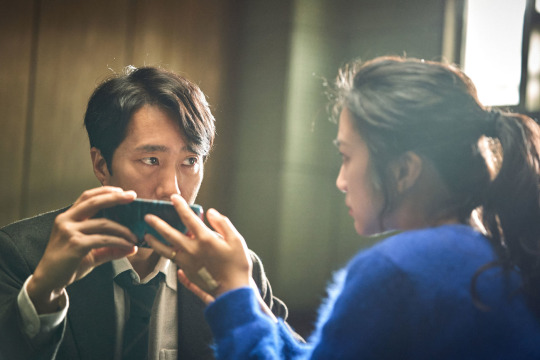
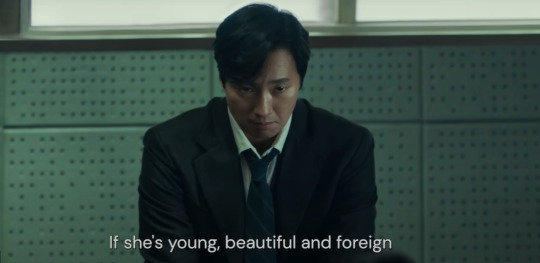
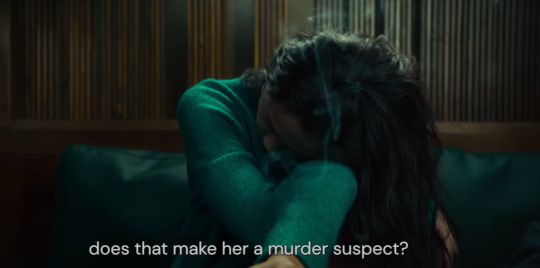
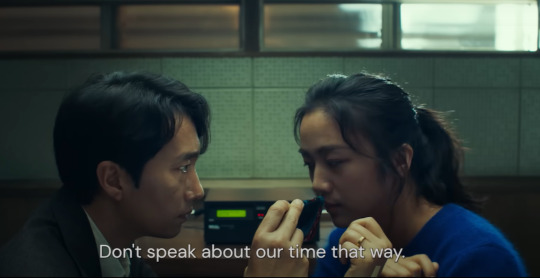
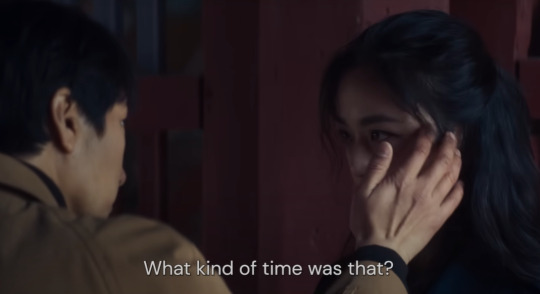
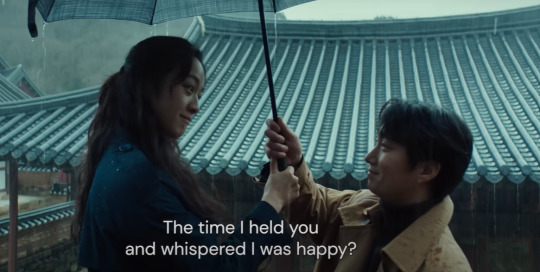
𝐃𝐞𝐜𝐢𝐬𝐢𝐨𝐧 𝐭𝐨 𝐋𝐞𝐚𝐯𝐞 (𝟐𝟎𝟐𝟐) | Fiction
★ ★ ★ ★: <crime, mystery, romance, film noir>
Happy new year! Hope everyone had a relaxing and enjoyable start.
Decision to Leave is directed by Park Chan-wook (other titles include the Handmaiden) and is a South-Korean film. I watched it on Netflix recently when I was in Korea (approx 139 mins running time).
The film depicts the interactions between a detective and his murder suspect (Tang Wei). The cinematography is beautiful and I love how much was expressed in a scene without saying much (dialogue wise). The translation piece for this work was also interesting and I love how the translator adapted the Chinese language for Korean and international audiences.
I've been waiting for it to be available for streaming on Mubi but it doesn't seem to be available just yet!
0 notes
Text

𝗪𝐡𝐲 𝐰𝐞 𝐬𝐥𝐞𝐞𝐩 by Matthew Walker | Non-Fiction (368 pages)
★ ★ ★ ★ : recommended reading <sleep, society, health, science and technology>
This book took me months to finish as I would read it before bedtime and something about reading sentences on the topic of sleep just quickly propels you into deep sleep!
‘Why we sleep’ is a wake-up call to the importance of sleep to our health, society’s “apathy toward sleep” and attitudes which the author claims is partly ‘caused by the historic failure of science to explain why we need it”.
While (and this may be a spoiler) the book doesn’t actually provide a reason as to *why* sleep is biologically required, it is a highly satisfying and insightful read as to the importance of it (and therefore why you should get adequate and good sleep). Some of my personal key takeaways are extracted below:
[𝐂𝐢𝐫𝐜𝐚𝐝𝐢𝐚𝐧 𝐫𝐡𝐲𝐭𝐡𝐦] - references plants that have an ‘endogenous’ or self-generated rhythm. Daylight isn’t the only signal that the brain can latch... and whilst light is the... primary zeitgeber, there are many factors that can be used in addition to, or in the absence of, daylight (pg. 18).
[𝐒𝐨𝐜𝐢𝐞𝐭𝐲’𝐬 𝐚𝐭𝐭𝐢𝐭𝐮𝐝𝐞𝐬] - society is strongly biased towards early start times that punish owls and favour larks (e.g. standard employment schedules). This leads to owls being more chronically sleep-deprived... and often forced to burn the proverbial candle at both ends. Greater ill health caused by a lack of sleep therefore befalls owls (pg. 21).
[[MORE]]
[𝐀𝐝𝐣𝐮𝐬𝐭𝐢𝐧𝐠 𝐲𝐨𝐮𝐫 𝐜𝐢𝐫𝐜𝐚𝐝𝐢𝐚𝐧 𝐫𝐡𝐲𝐭𝐡𝐦 - 𝐭𝐫𝐚𝐯𝐞𝐥 𝐚𝐧𝐝 𝐜𝐨𝐟𝐟𝐞𝐞] - for every day you are in a different time zone, your suprachiasmatic nucleus can only readjust by one hour (pg 25). Adenosine is a chemical barometer that continuously register the amount of elapsed time since you woke up this morning... wou can artificially mute the sleep signal of adenosine by using a chemical that makes you feel more alert and awake through caffeine (pg 27).
[𝐂𝐚𝐟𝐟𝐞𝐢𝐧𝐞] - levels of circulating caffeine peak approx. 30 minutes after oral administration. What is problematic though, is the persistence of caffeine in your system. Caffeine has an average 1/2 life of about 5-7 hours. E.g. if you have coffee after your evening dinner, around 7.30pm - this means that by 1.30am, 50% of that caffeine may still be active and circulating around your brain tissue. So at 1.30am, you’re only halfway to completing the job of cleansing your brain of the caffeine you drank after dinner (pg. 28)
[𝐑𝐄𝐌 𝐬𝐥𝐞𝐞𝐩] - During REM sleep, the memories were being replayed far more slowly: at just half or quarter the speed that measured when the rats were awake and learning the maze. This slow neural recounting of the day’s events is the best evidence we have to date explaining our own protracted experience of time in human REM sleep. This dramatic deceleration of neural time may be the reason we believe our dream life lasts far longer than our alarm clocks otherwise assert. (page 41). Dreams, as most of us think of them - those hallucinogenic, motoric, emotional and bizarre experiences with a rich narrative - come from REM sleep, and many sleep researchers limit (page 193)
[𝐒𝐥𝐞𝐞𝐩 𝐡𝐲𝐠𝐢𝐞𝐧𝐞] - the problem is that some people confuse time slept with sleep opportunity time. we know that many individuals in the modern world only give themselves 5-6.5 hours of sleep opportunity, which normally means they only obtain around 4.5-6hrs of actual sleep. (page 261). The artificial light that bathes our modern indoor worlds....halts the forward progress of biological time that is normally signalled by the evening surge in melatonin (page 267)
1 note
·
View note
Photo







𝐓𝐢𝐠𝐞𝐫𝐭𝐚𝐢𝐥 (𝟐𝟎𝟐𝟎) | Fiction
★ ★ ★: <multi-generational, Asian-American, love, family, independence>
Tigertail is available on Netflix and is a short film (approx 1.5hrs running time). It depicts the main character's search for an improved economic situation in America at the expense of childhood dreams and loved ones.
I appreciated the cinematography in some scenes and but I feel like many ideas were not fully explored throughout the film - e.g. family conflict, the character's rationale/thought process, final reflections whilst in America? I would still recommend watching, but it does feel a bit unresolved/superficial in some parts of the film! If you've watched it, what were your thoughts?
Belated Merry Christmas and Happy New Year! Hope you are all safe, healthy and generally happy ☺
1 note
·
View note
Photo
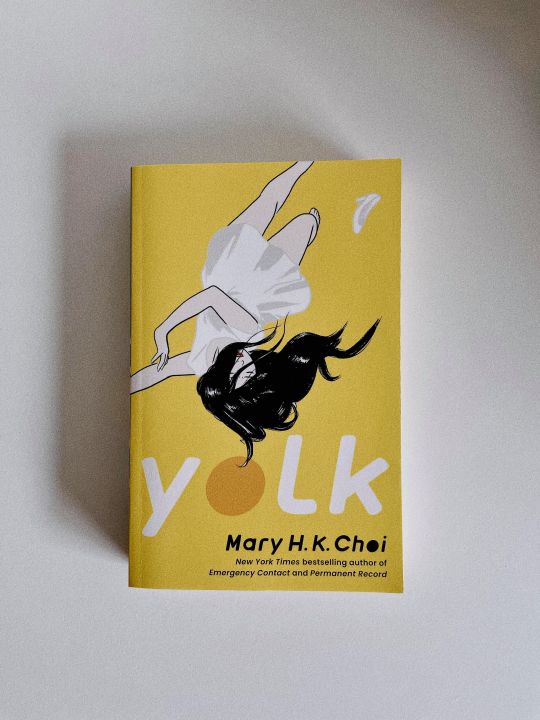
𝐘𝐨𝐥𝐤 by Mary HK Choi | Fiction (385 pages) ★★★: <family, slice of life, sisters, mental health, illness> This novel was probably my first foray into contemporary (young-adult) fiction written by an Asian female voice. I was initially intrigued by the cover design, and the 4.1/5 rating on Goodreads, but think this was slightly overhyped in my opinion! There are bouts of excellent writing in the book, and I occasionally loved the way that the author described thoughts, emotions and scenery. It was also refreshing to read a book with contemporary references - e.g. to certain brands, slang and her descriptions of the young professional working world.
However I didn't personally relate to the characters and sometimes found it illogical or difficult to comprehend their thoughts/actions, indirectly disrupting the flow of the storyline. The relationships between the characters, (mainly the sibling duo) also didn't comes across as fully developed in places, and undermined their authenticity. Despite this, I think this novel could provide comfort to some readers, and resonate particularly with the young-adult audience. I'd be keen to read her other works, particularly 𝐄𝐦𝐞𝐫𝐠𝐞𝐧𝐜𝐲 𝐂𝐨𝐧𝐭𝐚𝐜𝐭! 𝘐𝘧 𝘺𝘰𝘶'𝘷𝘦 𝘳𝘦𝘢𝘥 𝘠𝘰𝘭𝘬 𝘰𝘳 𝘌𝘮𝘦𝘳𝘨𝘦𝘯𝘤𝘺 𝘊𝘰𝘯𝘵𝘢𝘤𝘵, 𝘸𝘩𝘢𝘵 𝘥𝘪𝘥 𝘺𝘰𝘶 𝘵𝘩𝘪𝘯𝘬?
2 notes
·
View notes
Photo




𝐁𝐮𝐫𝐧𝐢𝐧𝐠 (2018) is a South Korean film adapted from the short story '𝘉𝘢𝘳𝘯 𝘉𝘶𝘳𝘯𝘪𝘯𝘨' by Haruki Murakami.
★ ★ ★ + ½ ☆ : <mystery, crime, slice of life>
Personally I'd recommend reading Murakami's short story first - it's been reproduced with permission on a number of sites online, and also included as part of 𝘛𝘩𝘦 𝘌𝘭𝘦𝘱𝘩𝘢𝘯𝘵 𝘝𝘢𝘯𝘪𝘴𝘩𝘦𝘴 short story collection in print.
At first, Murakami's short story seems like a straightforward mystery-thriller: a nameless narrator becomes acquainted with a twenty-year old female, who later meets a wealthy man in a trip to Algeria. The lives of the three characters collide, and the narrator becomes intrigued by the man's strange hobby of burning down barns.
Like other works by Murakami, words are selected meaningfully so that when you read between the lines, a different perspective of the story and the characters emerge. Even when you think you might have grasped the story, you're left with lingering questions about the reality of the events - foreshadowed at the beginning by the female friend's mime performance of Tangerine Peeling:
"This? It's easy. It [miming] has nothing to do with talent. What you do isn't to make yourself believe that there are tangerines there. You just forget that the tangerines are 𝘯𝘰𝘵 there. That's all."
In written form, the story for me was highly engaging and probably a 4.5/5 for me. The film adaptation however was probably a 3/5 overall, as it is more explicitly drawn out - e.g. when the man speaks about his hobby, he says 'its a crime so to speak' - 'its explicitly a crime' (as compared to the short story, which is more subtle).
Murakami's stories are difficult to adapt as a film though, as they tend to have a large emphasis on the mundane aspects of everyday life, so the plot moves slowly and relies on creative direction to replicate the atmosphere in his stories. Would still recommend watching the film though - but perhaps after reading the short story!
If you've read the short story or watched the film, what were your thoughts?
31 notes
·
View notes
Photo

𝐎𝐮𝐭𝐥𝐢𝐞𝐫𝐬 by Malcolm Gladwell | Non-Fiction (335 pages) ★ ★ ★ ★ : recommended reading <success, opportunity, careers> It's surprising that (in at least the edition that I purchased) the book was published in 2008 but only reached a wider readership in recent years. This book was another read that I enjoyed and overall recommend, if only for some of the key insights that were scattered across the chapters. Outliers is a non-fiction book about success at the peak of individuals in society (the outliers that Gladwell defines as 'markedly different in value'), told through various industries as examples. Some of my key takeaways (quotes aren't verbatim): 1. 𝐒𝐮𝐜𝐜𝐞𝐬𝐬 𝐚𝐬 '𝐜𝐮𝐦𝐮𝐥𝐚𝐭𝐢𝐯𝐞 𝐚𝐝𝐯𝐚𝐧𝐭𝐚𝐠𝐞'(p. 33) [case studies told through hockey players and birthdays]. A reflection on how one's success isn't solely derived as a function of individual merit, but cumulative opportunity (p. 213). 2. 𝐂𝐮𝐦𝐮𝐥𝐚𝐭𝐢𝐯𝐞 𝐚𝐝𝐯𝐚𝐧𝐭𝐚𝐠𝐞 𝐜𝐨𝐦𝐞𝐬 𝐟𝐫𝐨𝐦 𝐨𝐩𝐩𝐨𝐫𝐭𝐮𝐧𝐢𝐭𝐲 - e.g. once a musician enters a top music school - and is provided with level opportunities to sustain their skills - what distinguishes one performer from another is how hard they work (p. 43).
3. 𝐀 𝐦𝐢𝐧𝐢𝐦𝐮𝐦 𝐭𝐡𝐫𝐞𝐬𝐡𝐨𝐥𝐝 - but before [one] could become an expert - someone had to give him the opportunity to learn how to be an expert (p. 52).
4. 𝐒𝐨𝐜𝐢𝐞𝐭𝐚𝐥 𝐟𝐫𝐚𝐦𝐞𝐰𝐨𝐫𝐤, 𝐢𝐧𝐭𝐫𝐢𝐧𝐬𝐢𝐜 𝐢𝐧𝐞𝐪𝐮𝐚𝐥𝐢𝐭𝐲 - we pretend that success is exclusively a function of an individual's merit - but neglect that the outcomes are often a product of society's framework (p. 75). [I don't include this quote to discredit individual achievement but it is apt to acknowledge / emphasise that, without exception, the outcomes of every individual aren't exclusively because of hard work, talent or skills. Consider: class and cultural advantages].
5. 𝘊𝘭𝘢𝘴𝘴 𝘢𝘯𝘥 𝘤𝘶𝘭𝘵𝘶𝘳𝘢𝘭 𝘢𝘥𝘷𝘢𝘯𝘵𝘢𝘨𝘦𝘴: X is better off than Y - because X is wealthier and goes to a better school, but also, that a sense of entitlement that X has been taught is an attitude perfectly suited to succeeding in the modern world (p. 124).
6. 𝐓𝐢𝐦𝐢𝐧𝐠: it's not that they were smarter [lawyers] than anyone else - they had a skill that they had been working on for years that had suddenly become very valuable (p. 148) [Something I like to think of as an epsilon factor (ϵ)].
7. 𝐎𝐭𝐡𝐞𝐫 - once someone has a reached an IQ of ~120, having additional IQ points doesn't seem to translate into any real-world advantage (p. 88).
8. 𝐒𝐮𝐜𝐜𝐞𝐬𝐬 𝐚𝐬 𝐦𝐮𝐥𝐭𝐢𝐟𝐚𝐜𝐞𝐭𝐞𝐝 - p.174 - on meaningful careers; e.g. choosing between being an architect for $75k, or working in a tollbooth for $100k. The author presumes we'd choose the former because there is: complexity, autonomy and a relationship between effort and reward in doing creative work, which is more worthwhile to us than the extra $25k. [On reflection I'd also add to this quote that success is only valuable if you can derive happiness from the outcome].
2 notes
·
View notes
Photo

𝐈𝐟 𝐨𝐧 𝐚 𝐰𝐢𝐧𝐭𝐞𝐫'𝐬 𝐧𝐢𝐠𝐡𝐭 𝐚 𝐭𝐫𝐚𝐯𝐞𝐥𝐥𝐞𝐫 by Italo Calvino | Fiction (259 pages)
★ ★ ★ ★ : recommended reading <language, literature, academia, objectivity, gender>
This book is the first thing that comes to mind when I think of post-modern literary technique. You only have to open the contents page to get a sense of the level of experimentation at play - each chapter forms part of a sentence:
1. If on a winter's night a traveller
2. Outside the town of Malbork
3. Leaning from the steep slope
. . .
To cumulatively read: 'If on a winter's night a traveller outside the town of Malbork, learning from the steep slope without fear of wind or vertigo, looks down in the gathering shadow, in a network of lines that enlace, in a network of lines that intersect, on the carpet of leaves illuminated by the moon, around an empty grave, what story down there awaits its end?'
The first chapter takes no hesitation in breaking down the fourth wall, and Calvino talks directly to the reader as he describes Books You Haven't Read, Books That If You Had More Than One Life You Would Certainly Read But Unfortunately Your Days Are Numbered, Books You Can Borrow From Somebody, etc. .
It's overall quite the reading adventure and would highly recommend reading if you haven't already - or if it's on your shelf of 𝘉𝘰𝘰𝘬𝘴 𝘛𝘰 𝘙𝘦𝘢𝘥 𝘞𝘩𝘦𝘯 𝘠𝘰𝘶 𝘏𝘢𝘷𝘦 𝘛𝘪𝘮𝘦 𝘉𝘶𝘵 𝘍𝘰𝘳𝘵𝘶𝘯𝘢𝘵𝘦𝘭𝘺 𝘛𝘩𝘦𝘳𝘦 𝘐𝘴 𝘈 𝘊𝘰𝘷𝘪𝘥 𝘓𝘰𝘤𝘬𝘥𝘰𝘸𝘯 (lol).
1 note
·
View note
Photo

𝐒𝐚𝐩𝐢𝐞𝐧𝐬 by Yuval Noah Harari | Non-Fiction (443 pages)
★ ★ ★ ★ : recommended reading <society, humanity, science and technology>
This book was a tastebreaker for me in the non-fiction genre and I would highly recommend Harari's work (although Sapiens is the most well written imo). Sapiens canvasses the evolution of mankind from the beginning of time to c. 2019 (republished edition) through three revolutions: Cognitive, Agricultural and Scientific. Along the way, the author weaves science and humanist (a philosophy focus on human values and freedoms) insights that are accessible and relatable to everyone (there is no assumed knowledge).
The content isn't really ground-breaking, but I think what distinguishes this book is that most concepts have been written well - almost in a poetic way - and makes you view the history of civilisation from a fresh perspective. Even though I personally think the book drops off in quality and cohesiveness around the middle of the book, it picks back up towards the end and was definitely an insightful read overall.
Some of my key takeaways (quotes aren't verbatim):
1. 𝐇𝐮𝐦𝐚𝐧 𝐜𝐨-𝐨𝐩𝐞𝐫𝐚𝐭𝐢𝐨𝐧: the ability to create an imagined reality from words enabled large numbers of strangers to co-operate effectively (p. 36) and for co-operation of large groups, only a sophisticated religious or ideological system could sustain such efforts (p. 101). This extends to modern trade agreements, political structures and legal institutions which result from human's cognitive capacity to create fiction. P. 207 - Harari analogises money as a trust system - that bridges discrimination and cultural gaps - and 1) allows people to co-operate effectively, 2) create trust in the future (e.g. financial credit), which is based on an assumption that future resources are more abundant than present resources (p. 344). He observes that most human co-operation networks have been geared towards exploitation and oppression over time (p. 116).
2. 𝐈𝐦𝐚𝐠𝐢𝐧𝐞𝐝 𝐨𝐫𝐝𝐞𝐫: modern society operates through an imagined order that exists only in our minds, but is woven in the material reality around us (p. 127). This imagined order shapes our desires (i.e. your thoughts, ambitions and desires may be '𝘺𝘰𝘶𝘳𝘴' but they are certainly shaped by romantic, nationalist, capitalist and humanist myths that have been around for centuries). Harari gives the example of a common desire for individuals to travel overseas for a holiday, and notes that this isn't something that is necessarily biological, but the product of an individual who subscribes to romantic consumerism. [On a side note, I found out in a work trivia that Santa was originally green but changed to red as a result of Coca-Cola advertising...]. These imagined orders are inter-subjective, so in order to change them, we must simultaneously change the consciousness of billions of people, which is not easy (p. 135). A conscious effort has to be made to sustain laws, customs, procedures and manners, otherwise social order would quickly collapse.
𝟑. 𝐓𝐡𝐞 𝐣𝐨𝐮𝐫𝐧𝐞𝐲 𝐭𝐨 𝐦𝐨𝐝𝐞𝐫𝐧 𝐬𝐨𝐜𝐢𝐞𝐭𝐲 𝐚𝐧𝐝 𝐨𝐛𝐬𝐞𝐫𝐯𝐚𝐭𝐢𝐨𝐧𝐬:
<A. 𝘊𝘰𝘮𝘮𝘶𝘯𝘪𝘵𝘪𝘦𝘴 𝘮𝘰𝘷𝘦 𝘧𝘳𝘰𝘮 𝘯𝘢𝘵𝘶𝘳𝘢𝘭 𝘴𝘰𝘤𝘪𝘦𝘵𝘪𝘦𝘴 𝘵𝘰 𝘥𝘪𝘨𝘪𝘵𝘢𝘭> The domestication of animals was founded on a series of brutal practices that only became crueller with the passing of the centuries (p. 105), and the agricultural revolution was the turning point when Sapiens cast off its intimate symbiosis with nature and sprinted towards greed and alienation (p. 110).
<B. 𝘈𝘣𝘰𝘶𝘵 𝘸𝘰𝘳𝘬 𝘢𝘯𝘥 𝘵𝘩𝘦 𝘲𝘶𝘢𝘭𝘪𝘵𝘺 𝘰𝘧 𝘭𝘪𝘧𝘦> In the post-industrial environment (with its mega-cities, aeroplanes, telephones and computers, c/f hunter-gatherer lifestyles), we have more material resources and longer lives than previous generations, but it often makes us feel alienated, depressed and pressured (p. 45). There has also been a collapse of the nuclear family unit and the community, with the rise of individualism. With individuals wielding unprecedented powers to decide their own path in life, we find it harder to make commitments and therefore live an increasingly lonely world of unravelling communities and families (p. 428). Overall, it seems that humanity's search for an easier life released immense forces of change that transformed the world in ways nobody envisioned or wanted (p. 99) - that we have created convenience and yet live more stressed lives.
<C. 𝘔𝘪𝘴𝘤> You need to know alot about your own tiny field of expertise, but for the vast majority of life's necessities you rely blindly on the help of other experts, whose own knowledge is also limited to a tiny field of expertise (p. 55). Identical twins raised in opposing socio-economic backgrounds (poor vs wealthy), with the same abilities would not have had the same chance in developing personal wealth. The economic game was rigged by legal restrictions and unofficial glass ceilings (p. 154).
#sapiens: a brief history of humankind#yuval noah harari#non-fiction#bookreviews#bookreview#sapiensreview
3 notes
·
View notes
Photo




𝐒𝐮𝐩𝐞𝐫𝐧𝐚𝐭𝐮𝐫𝐚𝐥 (2018) | Art Exhibition (White Rabbit Gallery)
★ ★ ★ : recommended viewing <surveillance, environment, dystopian>
This exhibition was held in 2018 by the White Rabbit Gallery in Sydney, Australia, but many of the the works featured by the artists can also be found online (last photo in the carousel is by artist Chen Wei). See also media archives on Propviz for a virtual exhibit: [https://propviz.com.au/white-rabbit-gallery-supernatural-virtual-art-gallery-tour/].
𝘚𝘶𝘱𝘦𝘳𝘯𝘢𝘵𝘶𝘳𝘢𝘭 showcases a world depicted by artists in the near distant future. Uncanny events are signalled by hybrid insect-winged citizens that fly overhead in dystopian, neon-lit cities. Once harmonious landscapes, the natural environment is littered with plastic, and the skies above 'too often choked with toxic fog and haze'. Works are varied in form but communicate a shared intention, inviting visitors to experience a wake-up call to our human footprint.
[Wording heavily extracted and reproduced from the exhibit description].
1 note
·
View note
Photo
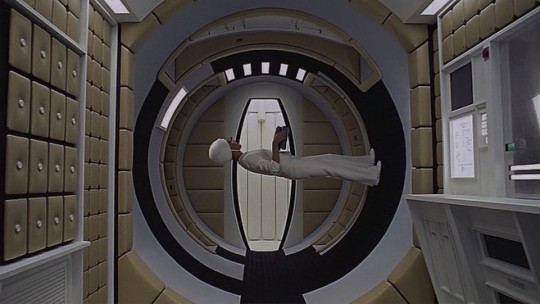
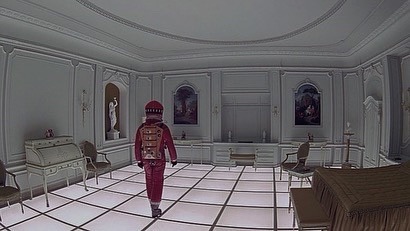
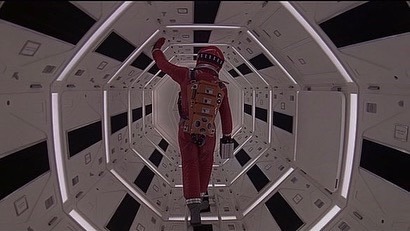
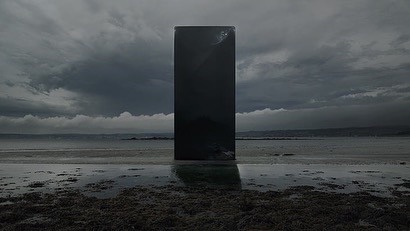
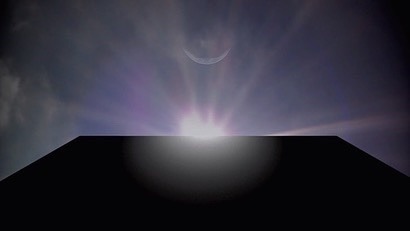

𝟐𝟎𝟎𝟏: 𝐀 𝐒𝐩𝐚𝐜𝐞 𝐎𝐝𝐲𝐬𝐬𝐞𝐲 (1968) directed by Stanley Kubrick | Sci-Fi (2 hr 44 min)
★ ★ ★ ★ : recommended viewing <artificial intelligence, evolution, space exploration, technology>
I first watched this film in 2013 and recently gave it another viewing during covid lockdowns. It surprises me that it was produced in 1968 because Kubrick's cinematography is 𝘴𝘵𝘪𝘭𝘭 so visually pleasing. While I would preface this film by saying it's not for everyone, I'd recommend it as a taste-breaker.
The film is quite long (almost 3 hrs running time) and has minimal plot developments and dialogue. The overall film experience can feel strange/unsettling sometimes, and I attribute this to 1) multiple subversions of what might be 'typical' film conventions, 2) build-up of musical climaxes matched with inactivity, 3) cinematography that still manages to convey a realistic sense of a science fiction world.
Even after a second viewing, I think the film leaves many unanswered questions and a bit of a feeling of 'what did I just watch'? But despite all its disorienting scenes, absurdist elements and layers of symbolism, what I enjoyed most was probably the film's explorations into the infinitude of space. On an uninterrupted viewing of the film, you become increasingly cognisant of the contrast between 1) the miniscule nature of humanity and 2) the significant cosmic relativity that overarches us which is... fascinating, but equally terrifying.
This film is followed by a sequel 𝟐𝟎𝟏𝟎: 𝐓𝐡𝐞 𝐘𝐞𝐚𝐫 𝗪𝐞 𝐌𝐚𝐤𝐞 𝐂𝐨𝐧𝐭𝐚𝐜𝐭 (1984) directed by Peter Hyams.
#stanleykubrick#kubrickfilms#2001 a space odyssey#aspaceodyssey#filmreview#sciencefiction#widereading#film#films
1 note
·
View note
Photo

𝗪𝐢𝐝𝐞 𝐑𝐞𝐚𝐝𝐢𝐧𝐠 (n.) — the practice of reading a variety of texts across mediums with a long-term aim of developing an interest in reading and/or encouraging curiosity in the diverse perspectives expressed in the works of a wide range of authors. * Introduced to me through the high school English curriculum, wide reading was a program designed to expose students to a wide variety of texts with diverse features and forms - cross-genre, language, and mode. There would be a set reading list with recommended and optional reading and a question to answer or reflect on per text - so that you'd actually (hopefully) engage!
In university, you'd transition to academic reading mostly only related to your field of study, but increasingly - 𝐲𝐨𝐮 are accountable for sourcing your own reading list. This account is a personal documentation of my reading archives - I consume alot of media but frequently forget what I've read! For non-fiction text types, I'll usually document my key takeaways, but I'll try and keep it high-level for fiction to avoid spoilers where possible. Thanks for visiting and I hope my posts inspire you to be curious about a new text, or engage with the world (whether fictional or real) through the perspective of someone different to yourself. *𝘵𝘩𝘪𝘴 𝘪𝘴 𝘮𝘺 𝘱𝘦𝘳𝘴𝘰𝘯𝘢𝘭 𝘥𝘦𝘧𝘪𝘯𝘪𝘵𝘪𝘰𝘯 - 𝘺𝘰𝘶 𝘮𝘪𝘨𝘩𝘵 𝘩𝘢𝘷𝘦 𝘢 𝘥𝘪𝘧𝘧𝘦𝘳𝘦𝘯𝘵 𝘵𝘢𝘬𝘦!
0 notes